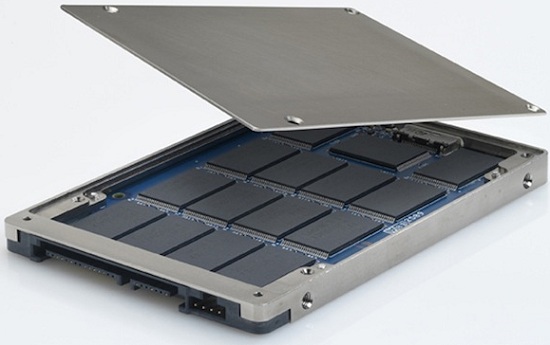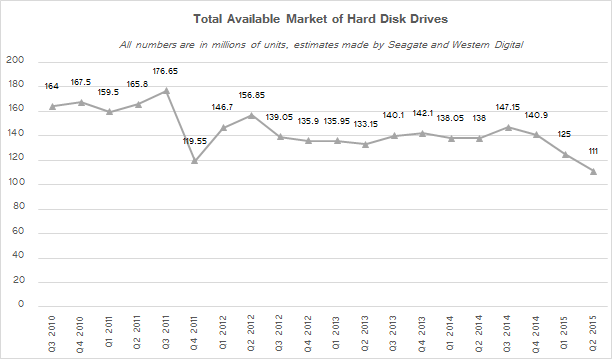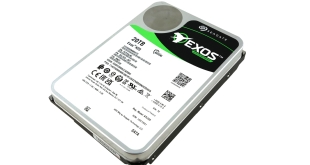The attitude of hard disk drives makers to solid-state drives is well known: they claim that such devices can only serve certain niche markets and cannot really compete against HDDs. On Friday chief executive of Seagate went on to say that nobody uses SSDs as storage devices.
Nowadays solid-state drives are used in various client personal computers. Notebooks use SSDs as primary storage solutions, desktops utilize solid-state drives as boot drives. But while it is pretty clear that SSDs have replaced hard disk drives from many systems and even whole product categories (e.g., from ultra-thin laptops), chief executive of Seagate claims that nobody actually uses solid-state drives as storage devices.
“There is no one that is using SSDs for storage,” said Steve Luczo, chief executive officer of Seagate, during the earnings conference call with investors and financial analysts. “I mean, maybe at the margin for replacing boot drives… I mean, maybe one or three per cent of the hierarchy is SSDs for storage. Most of our flash product is actually not hanging off the storage bus, it is fast memory.”
It is true that in desktops SSDs are primarily utilized as drives that are used to run operating system and frequently run applications, whereas large multimedia files are stored on high-capacity hard disk drives. In the datacentre, solid-state drives are used to store “hot” data, which essentially means that they are used for caching data that is accessed repeatedly.
However, it is also true that total available market of hard disk drives shrunk from 160 – 170 million units per quarter in 2010 – 2011 to around 110 – 111 million units in Q2 2015, based on estimates by Seagate and Western Digital. SSDs were of the key reasons why the number of hard drives sold per quarter decreased.
A good news for Seagate, WD and Toshiba is that as end-users adopt various client devices with NAND flash storage, they also start to use cloud data storage technologies, multimedia streaming and other services enabled by datacentres. The latter use a lot of expensive high-performance and high-capacity hard disk drives, something that clearly increases revenue and profitability of HDD makers.
Discuss on our Facebook page, HERE.
KitGuru Says: Both Seagate and WD essentially continue to ignore solid-state drives, especially for client PCs. While it is obvious that HDDs store the lion’s share of data worldwide, it is clear that solid-state storage is an established multi-billion dollar market that is simply not addressed by the two storage giants. One of the thing that has to be mentioned is that Steve Luczo is a business management genius, who turned Seagate around in 2000 – 2002 period.
 KitGuru KitGuru.net – Tech News | Hardware News | Hardware Reviews | IOS | Mobile | Gaming | Graphics Cards
KitGuru KitGuru.net – Tech News | Hardware News | Hardware Reviews | IOS | Mobile | Gaming | Graphics Cards





When we get affordable 1tb+ drives then i would happily use it for storage
Give it a few years, and hard drives will become the niche product.
Wow! I can’t believe they’re burying thier head in the sand like that! They may be ok in the server market for a while but In about 2 years I’ll be surprised if desktop pcs still come with hdd. You can already get 480gb for around £120 now.
How long before they change the name from hard drives to backup drives?
For serious data backup SSD is going to stay way more expensive and you don’t need SSD. If I want to back up TBs of photo and video, there is little to nothing to gain from paying extra for SSD when HDD suffices.
I actually agree with this 100%. I have a storage server in my garage with 11TB of storage for all of my blu ray/dvd rips (not even close to the amounts of storage used in enterprise), a 5TB HDD costs under £100 (admittedly not an enterprise HDD). Currently, an SSD costs 10x that.
Even assuming they could get past this in a few years and they end up being the same price. My HDDs are bottlenecked by my 1gigabit ethernet network at around 120-130MB/s transfer speed (when transferring large files, and let’s be honest, there’s not really any need to ‘store’ tiny files. Even photos from my iPhone are several MB now so the higher IOP/s in an SSD won’t make much of a difference.
The only reason an SSD would matter in terms of file storage would be if 10Gbit+ networking came to the consumer. and even then, a blu ray only reads at <60mbit, Meaning in theory I should be able to fast forward at 16x with what I already have now (gbit ethernet + HDD).
There is a huge market for SSDs and I wouldn't have a PC without one. But in terms of general storage (1TB for OS and some games is great) SSD is needless and expensive.
It’s so funny when CEOs blatantly ignore disruptive technologies. Denial. Denial. Denial.
Why does everyone seem to forget that SSDs fail faster than HDDs? The main reason HDDs are still used is because they are very reliable.
That might have been correct a few years ago when the likes of OCZ were pumping out
models with 60% failure rate,and a lot of Sandforce drives were a nightmare………
Today SSD’s are generally more reliable than spinning rust……………………
Article is clickbait.
A year ago Seagate had a really good SSD on the market-think it was called-600.
Trouble was the LAMD controller was bought out by Hynix.
Seagate responded by buying Sandforce-Who have been slow releasing new controller.
Magnetic drives are more resilient at the moment. It may change in the future with new memory technologies.
The ONLY downside I see for SSDs compared HDD is price/gb. Everything else is a positive: reliability, speed, acoustics, size, adaptability and temperatures all favour SSDs. The instant a terabyte SSD is less than £50, I can guarantee you no one will use hard drives other than for backup.
Seagate had a SSD out last year-600-was very good at the time….
Problem was it had a LAMD controller-that company was then bought by Hynix.
Seagate responded by buying Sandforce-but they are taking one hell of a long
time to get their new controller out……………….
I’d use it for storage if 2TB SSD was <$300
I use my 1tb SSD as my main boot drive. I have other non SSD’s for mass storage and backup though. So technically I guess I’m not using an SSD for purely storage.
The only reason we don’t use ssd’s for storage is because we don’t have affordable drives past 1tb!
Now if they were to come out and release 4tb ssd’s tomorrow at the same price as current hdd’s I can assure you I would replace my two 4tb hdd’s that are used as backup/storage.
Give it several years and he will be regretting his words.
I don’t use SSDs for storage YET because I’m sitting on TBs worth of data, and cannot currently afford the equivalent in SSD replacement.
When full-interger single digit TB SSDs come on the market, then I’ll be looking to switch, because why the hell would I not want to have my stuff load at magical speeds?
SSDs shouldn’t be used for storage anyway right? Correct me if I’m wrong, but they can’t handle as many writes as HDDs. Can they? Performance degrades more and more with multiple writes. Again, someone correct me if I’m getting this wrong.
SSDs would actually probably work out quite well for storage as long-term storage does not get written to very often. Being a boot / OS disk would put more strain on an SSD. I am not sure how data integrity lifespan (aka how long before data starts to degrade) compares between SSDs and HDDs though